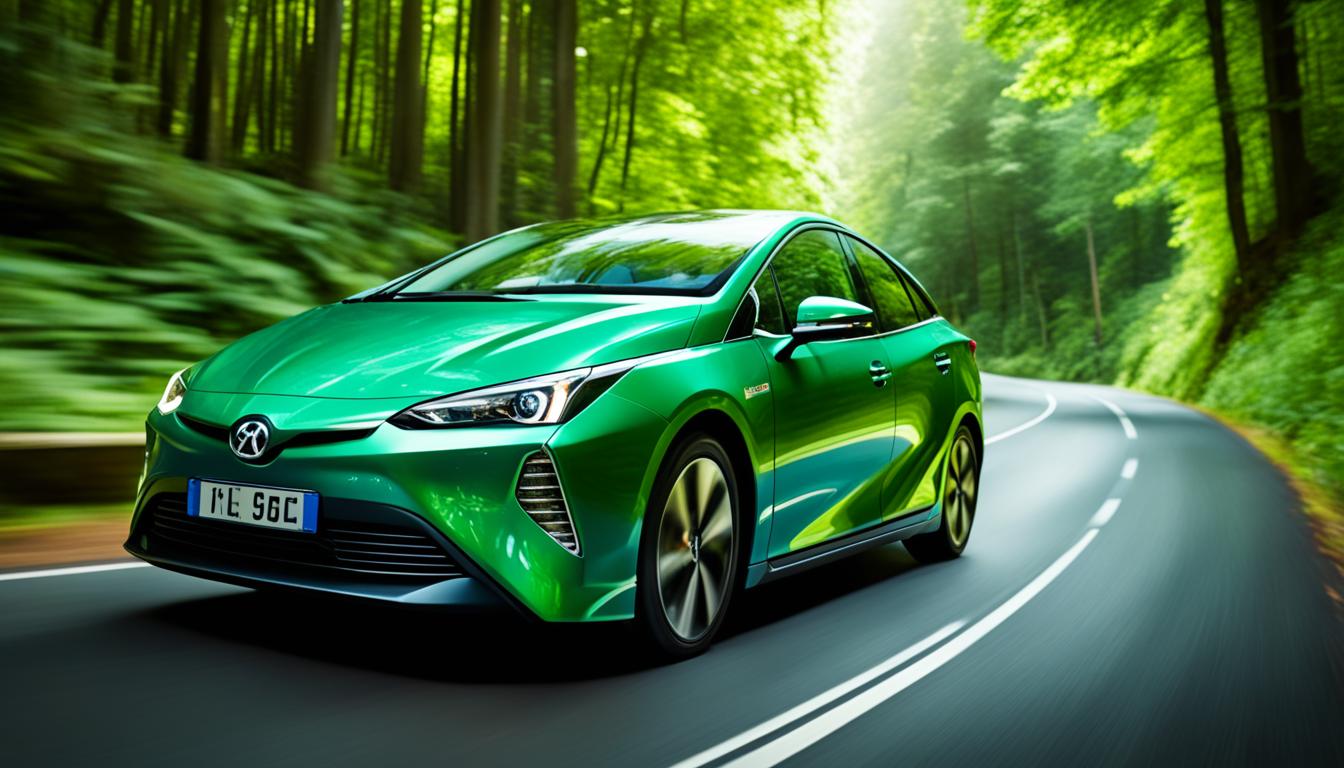In today’s world, more people are looking for eco-friendly cars. Hybrid cars are becoming more popular because of their efficiency. This article will look into how these cars work and why they are so fuel-efficient.
Hybrid cars use both an internal combustion engine and an electric motor. This combination helps them use less fuel than regular cars. But what makes them so efficient? Let’s find out the main reasons.
Contents
Key Takeaways
- Hybrid cars are 20-30% more fuel efficient than regular cars, especially in the city.
- They use an electric motor and regenerative braking to save energy that would be wasted.
- Hybrid engines can turn off when the car is stopped, saving even more fuel in traffic.
- Lightweight materials and aerodynamic designs also help hybrid cars use less fuel.
- Hybrid cars are most efficient in city driving, thanks to their electric motors and braking systems.
What Makes Hybrid Cars So Efficient?
Hybrid electric vehicles (HEVs) are renowned for their exceptional fuel efficiency, outperforming traditional gasoline or diesel vehicles. This efficiency stems from their unique powertrain, which combines an internal combustion engine with an electric motor.
Energy Conversion and Loss Reduction
Traditional vehicles lose significant energy through heat and friction. Hybrids mitigate these losses by:
- Utilizing an electric motor, highly efficient at low speeds
- Employing regenerative braking to capture and store energy
Advanced Technologies
Hybrid cars incorporate cutting-edge technologies to further enhance efficiency:
- Variable valve timing
- Turbocharging
- Cylinder deactivation
These technologies work in tandem with the hybrid powertrain to optimize fuel usage and reduce energy loss.
Hybrid vs. Conventional Engines: A Comparison
| Engine Type | Efficiency | Fuel Consumption |
|---|---|---|
| Conventional Gasoline | 20-25% | Higher |
| Conventional Diesel | 30% | Moderate |
| Hybrid Electric | 70-95% | Lower |
Hybrids excel in both engine efficiency and fuel economy, particularly in urban environments. On average, hybrid cars can achieve up to 50 miles per gallon, significantly surpassing traditional gasoline vehicles.
The Power of Regenerative Braking
Regenerative braking is a key technology that sets hybrid cars apart. This system:
- Converts braking energy into electricity for the battery
- Extends brake life by reducing wear
- Improves overall fuel efficiency
| Regenerative Braking Benefits | Impact |
|---|---|
| Improved Fuel Efficiency | Reduces fuel consumption and emissions |
| Extended Brake Life | Longer lifespan of brake components |
| Enhanced Battery Life | Reduces reliance on external charging |
| Increased Range | Extends distance between refueling |
| Lower Maintenance Costs | Reduces wear and tear on brake components |
Driving Conditions and Hybrid Efficiency
Hybrid cars perform best in city driving conditions. Studies show that hybrids use:
- 20% to 40% less fuel in urban environments
- 25% to 45% less fuel on short trips in cold weather
However, their efficiency advantage diminishes on highways where the electric motor and regenerative braking are less utilized.
Aerodynamics and Rolling Resistance
Hybrid efficiency isn’t just about the powertrain. Manufacturers focus on:
- Improving aerodynamics to reduce drag
- Developing low rolling resistance tires
These enhancements contribute to overall fuel efficiency and performance.
Fuel Efficiency in Numbers
A comparison between hybrid and non-hybrid models reveals significant savings:
| Vehicle Model | Fuel Economy (MPG) | Price Premium | Fuel Cost Savings (15,000 miles) | Payback Period |
|---|---|---|---|---|
| Toyota RAV4 LE | 30 | – | – | – |
| Toyota RAV4 Hybrid | 40 | $1,150 | $500 | Approx. 35,000 miles |
Benefits of Hybrid Cars
- Superior fuel economy (some models exceeding 50 mpg)
- Reduced emissions (up to one-third less than conventional cars)
- Responsive performance, especially at low speeds
- Quieter ride
The Future of Hybrid Technology
Hybrid vehicles play a crucial role in bridging the gap between traditional cars and fully electric vehicles. As technology advances and becomes more accessible, hybrids are paving the way for a greener future in transportation.
By offering improved fuel efficiency, lower emissions, and enhanced performance, hybrid cars present an attractive option for environmentally conscious drivers looking to reduce their carbon footprint without compromising on driving experience.

Hi, I’m Sufiyan, the developer behind this platform. I created FuelConsumptionCalculator.com to simplify fuel tracking for everyone — because understanding your vehicle shouldn’t require a degree in mechanics. I’m always working on adding more tools and content to make this site even more useful

